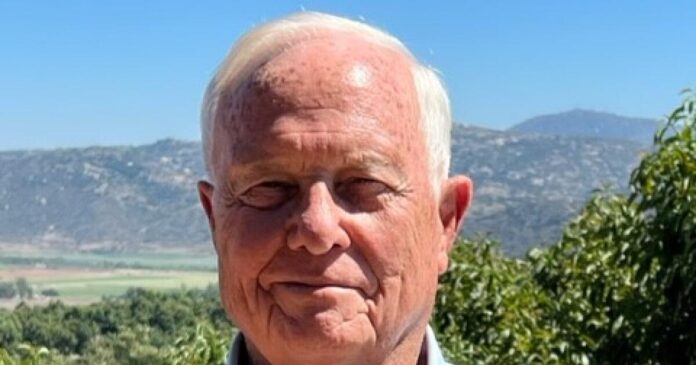In 1978, John Burr called Jeff Coors of Coors Brewery and described an exciting new idea. “John, we think it’s a fad,” Coors responded. “But please come and show us how it’s made.”
Burr flew to Colorado, met with Coors over coffee and wrote on a napkin the process for using enzymes to produce light beer.
That was the beginning of Coors Light.
Burr is an innovator and California farmer who comes from a long line of family farmers.
In 1869, Burr’s great-grandfather came to California from Scotland and became a pioneer in the citrus industry by using a cloning process. “A significant part of the California and Florida citrus industry was developed on trees from the Burr nursery,” wrote Julie Walker of the San Diego County Farm Bureau.
His grandfather grew citrus in the Central Valley and led an irrigation district that dug 39 wells in 1915, developed a new irrigation system, and was the first to use gunite instead of concrete.
Burr’s father started his own Central Valley farm with olives, citrus and cattle, which he grew to 250 acres.
“My dad was 100 percent farmer,” Burr said. “We had a good old-fashioned farming operation.”
Born in 1943, Burr and his two siblings grew up working on the farm when not in school. “I drove my first tractor at 7,” he said.
“It was a way of life.”
Burr attended Cal Poly San Luis Obispo with a focus on agriculture business, but also chemistry, which he believed was important to future farming.
After graduating in 1965, he worked for a series of agriculture-related chemical companies. He learned about enzymes in agriculture and led a decade-long effort promoting their use.
Enzymes are soluble proteins that cause natural reactions that can improve certain products.
In 1972, Burr advocated for use of enzymes to improve wine production. “I overcame initial resistance by having UC Davis conduct tests to show enzymes’ benefits. I then traveled to wineries throughout the West to demonstrate it,” he said.
The wine industry now widely uses enzymes.
Burr advanced use of enzymes in a variety of products, such as light beer, dairy and ethanol made from corn.
“In the late 1970s, we educated engineering companies on the use of enzymes to produce ethanol, which is today 10 percent of our fuel,” Burr said.
In addition to enzymes, Burr promoted agricultural innovations in the fields of robotics, sensors and biopesticides.
However, after decades working what he calls “downstream from ag,” Burr decided to return to farming.
He moved to San Diego and since 2006 has owned a large avocado farm in Escondido.
Burr has become a recognized leader in water management, drawing on his penchant for innovation and technology.
“It’s the use of innovative farming methods that earned John Burr the title of San Diego County Farmer of the Year,” wrote the San Diego County Water Authority in 2019.
“Satellites collect data, which Burr then analyzes with spreadsheets to determine how many gallons of water each tree requires,” the authority said.
“Every bit of data collected, from water usage to atmospheric conditions to soil type, allows Burr and his team to streamline their operations to be even more water-efficient.”
He co-founded Escondido Growers for Agricultural Preservation, which promotes innovative methods for agricultural water management.
Burr, 80, lives on the Escondido farm with his wife of 50 years, Christine. They have two adult children and three grandchildren.
His daughter is a partner in the farm, carrying on the Burr tradition.
Reflecting on changes in farming practices, he described how his great-grandfather used horse-drawn wagons to deliver pitch forks and manure to the fields.
“That was their era. My era was chemicalization of farming. This era is physics, sensors, imagery, drones and powerful tools.”
Although farming has changed from the 19th century, there is still a common thread.
“Farming,” Burr said, “is still a way of life.”
About this series
Jan Goldsmith is an Emeritus member of the U-T’s Community Advisory Board. He is an attorney and former law partner, judge, state legislator, San Diego city attorney and Poway mayor.
Someone San Diego Should Know is a column written by members of the U-T’s Community Advisory Board about local people who are interesting and noteworthy because of their experiences, achievements, creativity or credentials.



